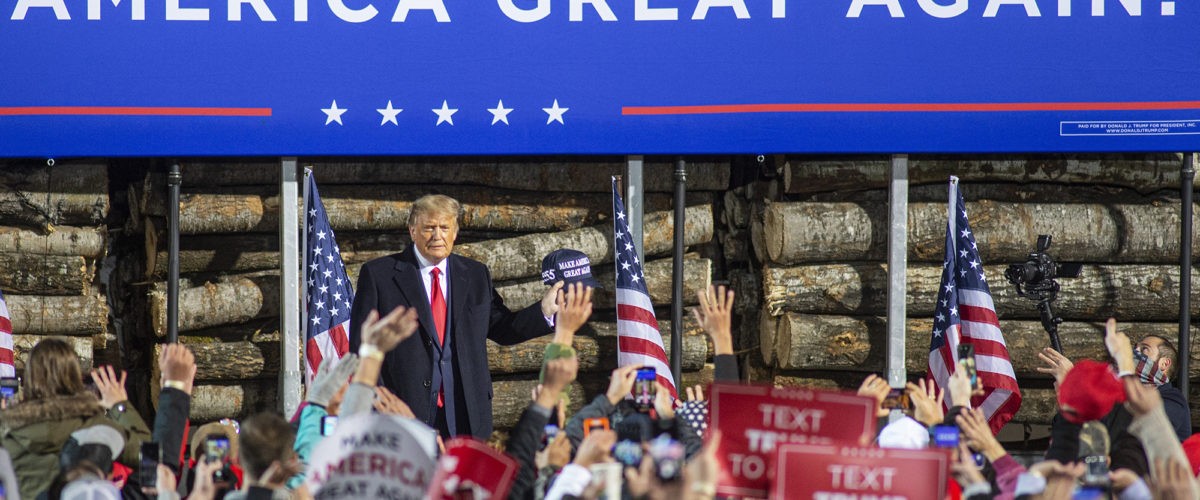An array of American faith-based organizations roundly condemned President Trump’s Sept. 30 decision to limit refugee resettlement in 2021 to no more than 15,000. That would be the lowest level on record, following a year that already brough an 80% reduction in refugee admissions.
This goal concerns legal immigration for refugees, not illegal immigration, which has been the rallying cry of conservatives under Trump’s encouragement.

Ali Al Sudani
“This number doesn’t reflect who we are. This number doesn’t reflect the capacity of the United States or the spirit of the United States,” said Ali Al Sudani, an Iraqi-born U.S. citizen and former refugee who now is chief programs officer for Interfaith Ministries for Greater Houston and manager of its refugee resettlement services.
What galls Al Sudani, refugee ministry leaders and national religious organizations is knowing that even with the historically low 15,000 limit for 2021, the numbers to gain entrance to the country likely will be much lower.
“Last year they set it at 18,000, but to our knowledge only about half that number came in,” said Marc Wyatt, Cooperative Baptist Fellowship field personnel who, with his wife, Kim, operates refugee ministries in North Carolina. “They keep lowering the number and not allowing in that number.”

Marc and Kim Wyatt
Data from the Migration Policy Institutes bears out that observation.
While the 30,000 ceiling was reached in 2019, targets of 45,000 in 2018 and 18,000 in 2020 didn’t come close. Actual admissions those years were 22,491 and 10,892, respectively, according to the MPI figures.
By comparison, the last full year of President Obama’s term, the refugee ceiling was set at 85,000 and fell only five short.
Religious groups react
Statements condemning the Trump Administration announcement were plentiful Oct. 1.
The Interfaith Immigration Coalition issued statements from several U.S. faith leaders, including CBF Executive Coordinator Paul Baxley, who urged the president to reconsider the 15,000 cap in favor of “a robust refugee admissions goal” to help the persecuted.
“As Christians, Cooperative Baptists take seriously the commandments to love our neighbors and welcome the stranger. As Baptists, we value religious freedom and champion religious liberty for all,” Baxley said. “As a result, CBF field personnel minister to communities of persecuted refugees across the globe and here in the U.S.”
Coalition Chair Elissa Diaz blasted the White House for putting the world’s vulnerable people at even greater risk.
 “The Trump administration is slamming the door on persecuted people during the worst displacement crisis in history, with 29.6 million refugees worldwide,” she said. “They are leaving thousands of people in precarious, life-threatening situations. President Trump has already cut the U.S. refugee resettlement program by more than 80% — last year’s presidential determination was another historic low, 18,000 — and failed to meet even that.”
“The Trump administration is slamming the door on persecuted people during the worst displacement crisis in history, with 29.6 million refugees worldwide,” she said. “They are leaving thousands of people in precarious, life-threatening situations. President Trump has already cut the U.S. refugee resettlement program by more than 80% — last year’s presidential determination was another historic low, 18,000 — and failed to meet even that.”
Sheila Katz, CEO of the National Council of Jewish Women, echoed the importance of faithfulness to the Torah’s demand for loving and welcoming the stranger.
“The current administration deciding to let only 15,000 refugees into our nation in 2021 is an affront to these values,” Katz said. “We must restore the basic principle that has guided America since its founding: that our nation is a home for all seeking a better life.”
A release from the Council on American-Islamic Relations said the president’s refugee policy reveals his attitudes about race and religion.
“The Trump administration’s clear white supremacist, Islamophobic and anti-immigrant agenda has been translated into a myriad of racist and xenophobic policies like the Muslim ban and the unending effort to bar entry to people of color,” said Robert McCaw, CAIR’s government affairs director. “This latest effort to target those seeking refuge in our nation is just part of the ongoing Trump administration effort to maintain systemic anti-Black racism and white supremacy.”
The human and national toll
Those who work with refugees say the president’s policy will serve as a blow to the nation’s moral reputation and cause widescale suffering around the world.
“If we are going to try to dismantle this program by steadily decreasing the number of refugees, it creates more damage down the line and more backlog that will go on for years,” Al Sudani said.
American religious groups also will suffer in losing opportunities to serve some of the most vulnerable people while the U.S. loses much-needed goodwill around the world.
Al Sudani speaks from experience. The former refugee came to the U.S. in 2009 from Iraq, where he had served coalition troops as an interpreter.
“I came as a refugee through this wonderful program to this wonderful land and this wonderful city, and I am a proud American now,” he said.
Wyatt said Welcome House ministries and others like it already have re-focused efforts due to historically low refugee arrivals. Apartment complexes that catered to refugees have largely lost that business, and refugee resettlement agencies have had to lay off caseworkers and close offices.
“That has pushed ministries like ours to focus on refugees who are already here,” he added.
But these adaptations do not address the humanitarian need that should be driving American refugee policies.
“First of all, it’s the right thing to do,” he said of resettlement. “Unprecedented numbers of people are displaced, and historically our country has shown benevolence to the displaced and the persecuted. And the Bible speaks about welcoming the stranger.”
With reduced legal immigration, the U.S. also loses a dedicated segment of the population that works hard and pays taxes, he explained.
“It’s not a financial burden on our country to allow refugees to come,” Wyatt said. “It advances us as a people. It provides diversification and it strengthens our relationship with the world. And it’s a good posture for our country to be kind to the vulnerable.”
The administration’s conflicting positions
The lowest-ever goal for legal refugee admission to the United States was released late on Sept. 30, just minutes before a legal deadline for the number to be sent to Congress and just a few hours after Trump “vilified refugees as an unwanted burden at a campaign rally in Duluth, Minn.,” according to U.S. News and World Report.
The magazine reported that Trump “assailed his opponent, former Vice President Joe Biden. He claimed Biden wants to flood the state with foreigners.”
Trump told the Minnesota crowd: “Biden will turn Minnesota into a refugee camp, and he said that — overwhelming public resources, overcrowding schools and inundating hospitals. You know that. It’s already there. It’s a disgrace what they’ve done to your state.”
Meanwhile, on the same day, Secretary of State Mike Pompeo said the Trump administration continues to lead the world in providing a safe place for refugees.
“We continue to be the single greatest contributor to the relief of humanitarian crisis all around the world, and we will continue to do so,” Pompeo said in Rome while atteding a conference on religious freedom. “Certainly so long as President Trump is in office, I can promise you this administration is deeply committed to that.”


